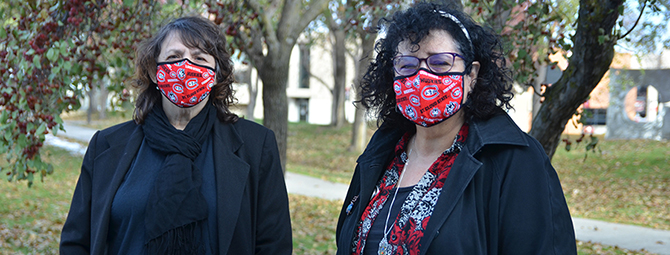The world is changing. Today there are more people older than 65 than under the age of 5 living in the world today.

This is a positive statistic, says Dr. Phyllis Greenberg, professor in the St. Cloud State University Department of Gerontology. People are living longer and healthier lives and are looking for more engagement opportunities. St. Cloud State has had 80 year old students attend for both graduate and undergraduate education.
“The reality is people are living longer and living healthier,” said. Dr. Rona Karasik, Gerontology professor. “What is bad about not dying? Aging isn’t bad.”
Greenberg and Karasik are leading an Age-Friendly campus initiative with the goal of St. Cloud State becoming one of the campuses in Minnesota to join the Age-Friendly University Global Network, which is a network of 70 higher education institutions around the world that are committed to becoming more age-friendly in programs and policies by endorsing 10 principles of an Age Friendly University.
Their work is supported by a $10,000 Small Seed grant from the Minnesota State Educational Innovations spring 2020 funding round. The grants support projects that show great potential for improving teaching, learning and access to students across the Minnesota State system.
Becoming an Age-Friendly University will have many benefits for traditional age students in that it will encourage more inter-generational activities and better prepare students to work and engage with older adults when they enter the workforce, Greenberg said.
“Younger people can diminish negative stereotypes they might have about older people and vice versa,” Greenberg said.
Becoming age-friendly also aligns with moves made by Gov. Tim Walz to make Minnesota an age-friendly state. Gov. Walz signed the proclamation in December 2019 in recognition of the fact that the number of adults older than 65 living in Minnesota was expected to exceed the number of children under 18 this year.
Karasik and Greenberg are preparing St. Cloud State to adopt the 10 principles by assessing how the campus currently serves older adults and what campus could do in the future to increase access. They surveyed students, faculty and staff on how campus is doing serving older adults currently during fall semester. Those findings will help them to determine the university’s strengths and where improvements are needed and to develop priorities for the next academic year.
They are also planning a virtual event for spring to engage older adults.
Life-long learning is a focus of the It’s Time framework developed by President Robbyn Wacker that recognizes the changing realities of society and universities throughout the country.
Fewer traditional-age college students are graduating from high schools and more older adults are returning to campus to finish a degree, pursue education to support a career change or to pursue interests and passions.
St. Cloud State is a member of the Academy of Gerontology in Higher Education, which has also adopted the Age-Friendly University principles.
About the Age-Friendly University Global Network
The Age-Friendly University Global Network started in Dublin where educators developed the 10 principles concept.
The 10 principles are active in all aspects of a university to support older adults seeking education for career development or second careers, to widen access to online education and expand activities available on campus for older adults. The network is about universities responding to the increased complexity of aging and meeting the needs of older adults.
Members of the Age-Friendly Global Network adopt the 10 principles and strive to work toward implementing all 10 to make their campuses more welcoming for students of all ages.
10 Age-Friendly University Principles
- To encourage the participation of older adults in all the core activities of the university, including educational and research programs.
- To promote personal and career development in the second half of life and to support those who wish to pursue second careers.
- To recognize the range of educational needs of older adults (from those who were early school-leavers through to those who wish to pursue Master’s or PhD qualifications).
- To promote intergenerational learning to facilitate the reciprocal sharing of expertise between learners of all ages.
- To widen access to online educational opportunities for older adults to ensure a diversity of routes to participation.
- To ensure that the university’s research agenda is informed by the needs of an aging society and to promote public discourse on how higher education can better respond to the varied interests and needs of older adults.
- To increase the understanding of students of the longevity dividend and the increasing complexity and richness that aging brings to our society.
- To enhance access for older adults to the university’s range of health and wellness programs and its arts and cultural activities.
- To engage actively with the university’s own retired community.
- To ensure regular dialogue with organizations representing the interests of the aging population.
About the Gerontology program
St. Cloud State University offers a master’s degree and a minor in Gerontology. Students come to the program from a variety of fields.
Gerontology is inherently inter-disciplinary because older adults have a variety of interests and areas of involvement.
Outside of the health and human services professions, a degree or minor in Gerontology pairs well with majors or careers in hospitality, tourism, economics, design and sustainability.
The aging of the population is involving every field, said Dr. Rona Karasik.
Engineering advancements designed to assist older adults and others with mobility issues have led to new advancements and cool features like pull out drawers in houses, connected devices and more, so knowing about the needs of older adults is exciting and leads to changes that become part of everyday life for everyone, she said.



